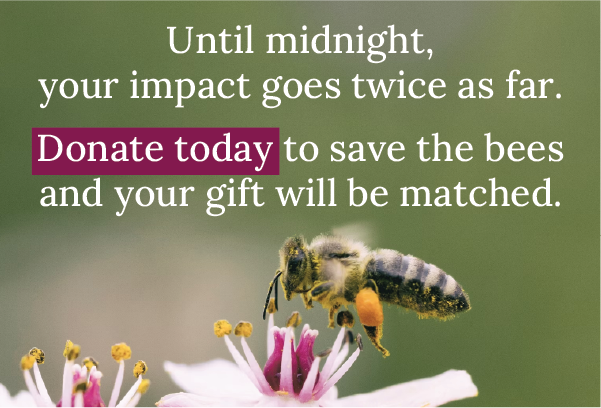
John,
From the moment a baby bee hatches, its tiny brain is under attack.
Neonicotinoids are a neurotoxin, affecting a bee's ability to learn, dance and fly for their entire lives.1
Baby bees deserve to grow up in a world without toxic pesticides. And that's where we come in.
Today only, generous donors are matching donations to support Environment Colorado's work to save generations of bees from toxic pesticides.
Thank you,
Ellen Montgomery
1. Katie Hunt, "Pesticides damage the brains of baby bees, new research finds," CNN, March 3, 2020.
---------- Forwarded message ----------
From: Environment Colorado <[email protected]>
Date: Tuesday, September 24, 2024
Subject: Match opportunity: Help save baby bees
To: John xxxxxx <[email protected]>

John,
Pesticides are wreaking havoc on pollinator populations. And the ones that are most vulnerable? Baby bees.
CT scans show that neonicotinoid pesticides, or "neonics," attack baby bumblebee brains while they're still developing, creating neurological damage that can make their whole lives difficult.1
From banning pesticides to urging companies to take neonics off their shelves, we're running nationwide campaigns to save the bees. And starting right now, your contribution to those campaigns will have double the impact. Until midnight, generous donors are matching gifts dollar for dollar, up to $10,000 nationwide.
Since their introduction in the 1990s, toxic neonics have quickly become the most widely used insecticide in the world.2 And the more neonics that enter our environment, the worse it gets for our pollinators.
When an unlucky bee encounters one of these pesticides, it could paralyze her, cause uncontrollable shaking, or kill her outright.3
Bad news for pollinators is bad news for everyone. Bees are responsible for pollinating 80% of flowering plants, and it's estimated that we have pollinators to thank for one out of every three bites of food we eat.4,5
But we also know that saving the bees is important for the simple fact that the smallest, most vulnerable creatures on our planet deserve a chance to live and thrive.
That's why this fall, we're strengthening our Save the Bees campaign. If you donate before midnight tonight, your contribution will go twice as far to protect our pollinators. Can I count on you to make a donation?
We're making progress -- Colorado already prohibits the use of bee-killing pesticides.6 But with bee populations still in turmoil, more needs to be done.
With the help of contributions like yours, we'll work to protect millions of acres of habitat for pollinators, call on companies to take neonics off their shelves, and advocate for federal neonic regulation.
From the largest wild animal to the tiniest baby bee, the creatures of our world serve a vital role in the ecosystems that make our planet vibrant and habitable. And they deserve our protection.
Thank you,
Ellen Montgomery
1. Steve Blackledge, "3 ways neonic pesticides are harming bees," Environment America, April 19, 2024.
2. Thomas James Wood and Dave Goulson, "The environmental risks of neonicotinoid pesticides: a review of the evidence post 2013," Environmental Science and Pollution Research International, June 7, 2017.
3. Oliver Milman, "Fears for bees as US set to extend use of toxic pesticides that paralyse insects," The Guardian, March 8, 2022.
4. "Five surprising facts you might not know about bees," Environment America, October 2, 2023.
5. "The Importance of Pollinators," U.S. Department of Agriculture, last accessed September 13, 2024.
6. Wendy Wendlandt and Steve Blackledge, "What's being done to save the bees?" Environment America, August 21, 2024.
Your donation will be used to support all of our campaigns to protect the environment, from saving the bees and protecting public lands, to standing up for clean water and fighting climate change. None of our work would be possible without supporters like you. Environment Colorado may transfer up to $50 per dues-paying member per year into the Environment Colorado Small Donor Committee.
Environment Colorado, Inc.
1543 Wazee St., Suite 400, Denver, CO 80202, (303) 573-3871
Member questions or requests call 1-800-401-6511.
Facebook | Twitter
If you want us to stop sending you e-mail then follow this link -- Unsubscribe

